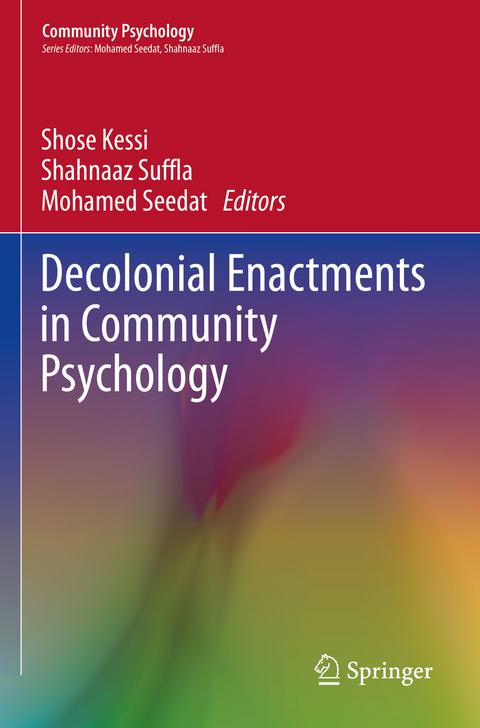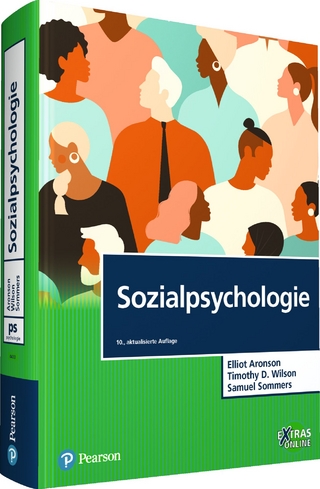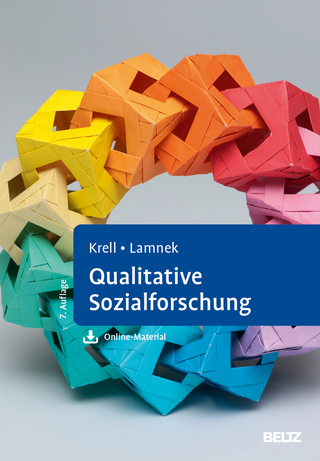
Decolonial Enactments in Community Psychology
Springer International Publishing (Verlag)
978-3-030-75203-3 (ISBN)
This edited volume in the Community Psychology Book Series emphasizes applications of community psychology for disrupting dominant and hegemonic power relations. The book explores domains of work that are located within critical community psychology, as well as work that is conventionally not self-defined as community psychology but which draws on and contributes to the foundations and enactments of critical and liberatory community psychology. Specifically, the book advances conceptions and praxes for community psychology grounded within a decolonial framework. The volume heeds the call for a generation of approaches to community psychology that link local struggles to broader questions of power, identity, and knowledge production, bringing together examples of praxes from different contexts as a political project of highlighting indigenous struggles toward self-determination. Collectively, the chapters in this book embody a decolonial agenda for community psychology that foregrounds social justice; the lives and knowledges of the marginalized and oppressed; epistemic disobedience and transdisciplinarity; and decolonial aesthetics. The book is divided into two parts - Part I: Conceptions of Engagement for Community Psychology delves into the conceptual framework for a decolonial community psychology, and Part II: Modes of Enactments and Praxes for Community Psychology builds on these theoretical advancements through examples of praxis in different contexts. The audience for the book includes scholars, researchers, practitioners, activists, and students located within community psychology specifically, as well as disciplines within the health and social sciences, and arts and humanities more broadly.
Shose Kessi is Associate Professor in the Department of Psychology at the University of Cape Town (UCT) and Dean of the Faculty of Humanities. Professor Kessi is the founder and the first chairperson of the UCT Black Academic Caucus (BAC), an organisation that has been a leader in the transformation debate at UCT. Her innovations in teaching and research, in addition to her contributions to institutional leadership, are an integral part of the project of transformation and decolonisation in higher education, and her focus on participatory action research also mitigates the epistemic violence of traditional research practices by bridging the gap between academic knowledges and the knowledges of marginalized communities. She received the Harvard-Mandela fellowship in 2014, the Erik Erickson Award for political psychology in 2018, has published extensively in journals, and was a visiting scholar at the London School of Economics and Political Science (LSE).
Part I: Conceptions of Engagement for Community Psychology.- Chapter 1: Community Psychology in Historical Context: Power, Identity and Knowledge.- Chapter 2: The Coordinates of Decolonising Practice and Praxis in Community Psychology.- Chapter 3: Community and the Making of Community: Critiques and Critical Conceptions.- Chapter 4: Interrogating Dominant and Liberatory Narratives on Engagement in Community Psychology.- Chapter 5: Psycho-social Change and Africa-centred Community Psychology.- Decolonising Participatory Action Research in Community Psychology.- Part II: Modes of Enactments and Praxes for Community Psychology.- Chapter 7: Maori - and Aboriginal-centred Community Psychologies for Well-being and Self-determination.- Chapter 8: Everyday Violence and Everyday Peace: Interventions Towards Social Justice.- Chapter 9: Post-conflict Reconciliation and Community-based Restorative Justice.- Chapter 10: The Workings of Imagination and Memory in Resistance to Violence.- Chapter 11:Immigration and Sense of Community.- Chapter 12: Poverty and Sustainable Living.- Chapter 13: A Decolonising Approach to Health Promotion.- Chapter 14: Youth Activism and Community Change.- Chapter 15: Social Justice and Food Security: Intervening in Global South Contexts.- Chapter 16: The Politics and Praxis of Social Transformation: A Civil Society Perspective.- Conclusion: Re-imagining Praxis, Community, and Engagement.
| Erscheinungsdatum | 05.12.2022 |
|---|---|
| Reihe/Serie | Community Psychology |
| Zusatzinfo | XII, 280 p. |
| Verlagsort | Cham |
| Sprache | englisch |
| Maße | 155 x 235 mm |
| Gewicht | 446 g |
| Themenwelt | Geisteswissenschaften ► Psychologie ► Sozialpsychologie |
| Schlagworte | A decolonizing approach to health promotion • Africa-centered community psychology • Community and making of community • Community-based restorative justice • Conceptions of engagement for community psychology • Decolonizing participatory action research • Decolonizing practice and praxis • Dominant and liberatory narratives on engagement • global South • Imagination and memory in resistance to violence • Immigration and community • Interventions towards social justice • Maori- and Aboriginal-centred community psychologies • Māori- and Aboriginal-centred community psychologies • post-conflict reconciliation • Poverty and sustainable living • Power, identity, and knowledge • Psycho-social change • Social justice and food security • Well-being and self-determination • Youth activism and community change |
| ISBN-10 | 3-030-75203-8 / 3030752038 |
| ISBN-13 | 978-3-030-75203-3 / 9783030752033 |
| Zustand | Neuware |
| Haben Sie eine Frage zum Produkt? |
aus dem Bereich


